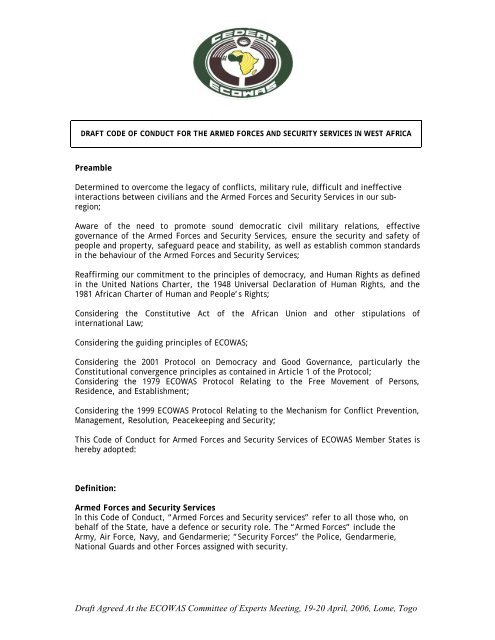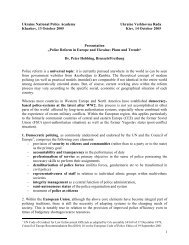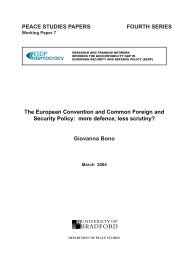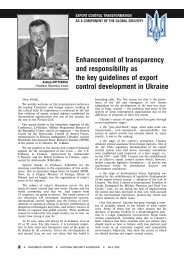Draft Agreed At the ECOWAS Committee of Experts Meeting ... - DCAF
Draft Agreed At the ECOWAS Committee of Experts Meeting ... - DCAF
Draft Agreed At the ECOWAS Committee of Experts Meeting ... - DCAF
You also want an ePaper? Increase the reach of your titles
YUMPU automatically turns print PDFs into web optimized ePapers that Google loves.
DRAFT CODE OF CONDUCT FOR THE ARMED FORCES AND SECURITY SERVICES IN WEST AFRICA<br />
Preamble<br />
Determined to overcome <strong>the</strong> legacy <strong>of</strong> conflicts, military rule, difficult and ineffective<br />
interactions between civilians and <strong>the</strong> Armed Forces and Security Services in our subregion;<br />
Aware <strong>of</strong> <strong>the</strong> need to promote sound democratic civil military relations, effective<br />
governance <strong>of</strong> <strong>the</strong> Armed Forces and Security Services, ensure <strong>the</strong> security and safety <strong>of</strong><br />
people and property, safeguard peace and stability, as well as establish common standards<br />
in <strong>the</strong> behaviour <strong>of</strong> <strong>the</strong> Armed Forces and Security Services;<br />
Reaffirming our commitment to <strong>the</strong> principles <strong>of</strong> democracy, and Human Rights as defined<br />
in <strong>the</strong> United Nations Charter, <strong>the</strong> 1948 Universal Declaration <strong>of</strong> Human Rights, and <strong>the</strong><br />
1981 African Charter <strong>of</strong> Human and People’s Rights;<br />
Considering <strong>the</strong> Constitutive Act <strong>of</strong> <strong>the</strong> African Union and o<strong>the</strong>r stipulations <strong>of</strong><br />
international Law;<br />
Considering <strong>the</strong> guiding principles <strong>of</strong> <strong>ECOWAS</strong>;<br />
Considering <strong>the</strong> 2001 Protocol on Democracy and Good Governance, particularly <strong>the</strong><br />
Constitutional convergence principles as contained in Article 1 <strong>of</strong> <strong>the</strong> Protocol;<br />
Considering <strong>the</strong> 1979 <strong>ECOWAS</strong> Protocol Relating to <strong>the</strong> Free Movement <strong>of</strong> Persons,<br />
Residence, and Establishment;<br />
Considering <strong>the</strong> 1999 <strong>ECOWAS</strong> Protocol Relating to <strong>the</strong> Mechanism for Conflict Prevention,<br />
Management, Resolution, Peacekeeping and Security;<br />
This Code <strong>of</strong> Conduct for Armed Forces and Security Services <strong>of</strong> <strong>ECOWAS</strong> Member States is<br />
hereby adopted:<br />
Definition:<br />
Armed Forces and Security Services<br />
In this Code <strong>of</strong> Conduct, “Armed Forces and Security services” refer to all those who, on<br />
behalf <strong>of</strong> <strong>the</strong> State, have a defence or security role. The “Armed Forces” include <strong>the</strong><br />
Army, Air Force, Navy, and Gendarmerie; “Security Forces” <strong>the</strong> Police, Gendarmerie,<br />
National Guards and o<strong>the</strong>r Forces assigned with security.<br />
<strong>Draft</strong> <strong>Agreed</strong> <strong>At</strong> <strong>the</strong> <strong>ECOWAS</strong> <strong>Committee</strong> <strong>of</strong> <strong>Experts</strong> <strong>Meeting</strong>, 19-20 April, 2006, Lome, Togo
CHAPTER I<br />
GENERAL PRINCIPLES<br />
Principle 1<br />
The Armed Forces and Security Services are <strong>the</strong> cradle <strong>of</strong> national unity and cohesion.<br />
Therefore, personnel recruitment and management shall be conducted without<br />
discrimination as to race, gender, ethnic, regional or religious affiliation.<br />
Principle 2<br />
The Armed Forces and Security Services shall be at <strong>the</strong> disposal <strong>of</strong> <strong>the</strong> constitutionally<br />
established political authority and are subordinated to <strong>the</strong> constitutionally democratically<br />
elected authorities. Political authorities and groups shall refrain from undue interference<br />
or to extend partisan politics to <strong>the</strong> operations <strong>of</strong> <strong>the</strong> Armed Forces and Security Services.<br />
Personnel <strong>of</strong> <strong>the</strong> Armed Forces and Security Services shall observe strict neutrality in<br />
partisan political matters;<br />
Principle 3<br />
The Armed Forces and Security Services are at <strong>the</strong> service <strong>of</strong> <strong>the</strong> nation and <strong>the</strong> people.<br />
Their mission shall be to guarantee, if necessary by force <strong>of</strong> arms, defence <strong>of</strong> <strong>the</strong> Nation<br />
and <strong>the</strong> territorial integrity <strong>of</strong> <strong>the</strong> state, ensure <strong>the</strong> protection <strong>of</strong> citizens and property as<br />
well as maintain peace and security in <strong>the</strong> <strong>ECOWAS</strong> sub-region.<br />
Principle 4<br />
In <strong>the</strong> conduct <strong>of</strong> defence and security affairs, <strong>the</strong> behaviour <strong>of</strong> armed and security<br />
personnel shall duly uphold international humanitarian law, human rights and pertinent<br />
national laws and show due regard to property and <strong>the</strong> physical integrity and psychological<br />
well-being <strong>of</strong> persons.<br />
Principle 5<br />
In situations <strong>of</strong> armed conflict, all armed groups and individuals are subject to Human<br />
Rights, International Humanitarian Law and pertinent national laws.<br />
CHAPTER II<br />
ARMED FORCES AND SECURITY SERVICES, HUMAN RIGHTS AND INTERNATIONAL<br />
HUMANITARIAN LAW<br />
Article 1<br />
In addition to <strong>the</strong>ir pr<strong>of</strong>essional training, Armed Forces and Security Services personnel,<br />
shall each be given <strong>the</strong> education in constitutional law, human rights, international<br />
humanitarian law, and peacekeeping appropriate to <strong>the</strong>ir rank in order to build and<br />
enhance <strong>the</strong>ir capacity to meet rapidly changing challenges and threats.<br />
Article 2<br />
Civilian political or administrative authority, personnel <strong>of</strong> Armed Forces and Security<br />
Services and <strong>the</strong>ir commanders, shall be held individually responsible for instructions,<br />
orders and/or actions and omissions in violation <strong>of</strong> human, rights international<br />
humanitarian Law, and relevant domestic laws.<br />
Article 3<br />
<strong>Draft</strong> <strong>Agreed</strong> <strong>At</strong> <strong>the</strong> <strong>ECOWAS</strong> <strong>Committee</strong> <strong>of</strong> <strong>Experts</strong> <strong>Meeting</strong>, 19-20 April, 2006, Lome, Togo
In <strong>the</strong> exercise <strong>of</strong> <strong>the</strong>ir duties, armed and security personnel shall provide adequate<br />
protection, refuge and assistance to all persons in need. They shall ensure that internally<br />
displaced persons, refugees, non-nationals, stateless persons, minorities, women, children,<br />
<strong>the</strong> elderly, and people with disabilities are not discriminated against. No one shall<br />
discriminate on <strong>the</strong> basis <strong>of</strong> race, identity, religion, political beliefs, status or condition.<br />
Article 4<br />
During exceptional circumstances, such as state <strong>of</strong> emergency, state <strong>of</strong> siege as defined by<br />
<strong>the</strong> Constitution and <strong>the</strong> <strong>ECOWAS</strong> Mediation and Security Council, Armed Forces and<br />
Security Services shall conform to <strong>the</strong>ir own national law and international humanitarian<br />
law as well as accepted international customary norms. <strong>At</strong> all times Armed Forces and<br />
Security Services personnel should be aware <strong>of</strong> and respect basic fundamental human<br />
rights.<br />
Article 5<br />
Personnel <strong>of</strong> Armed Forces and Security Services shall refrain in all circumstances from <strong>the</strong><br />
following acts: murder, torture, corporal punishment, rape, mutilation, cruel, inhumane,<br />
and degrading treatment, hostage taking, collective punishment, and any o<strong>the</strong>r act,<br />
including intimidation and threats, aimed at impairing <strong>the</strong> physical and psychological wellbeing<br />
<strong>of</strong> <strong>the</strong> individual.<br />
Article 6<br />
In enforcing domestic law and order, Armed Forces and Security Services shall use firearms<br />
as a last resort with maximum restraint, and respect <strong>the</strong> principle <strong>of</strong> minimum force, even<br />
in situations <strong>of</strong> self-defence. After <strong>the</strong> use <strong>of</strong> firearms and in <strong>the</strong> event <strong>of</strong> injuries, <strong>the</strong><br />
personnel <strong>of</strong> Armed Forces and Security Services shall assist <strong>the</strong> wounded without<br />
discrimination. The families <strong>of</strong> <strong>the</strong> victims shall be informed. A public enquiry shall be<br />
opened, and a report issued.<br />
CHAPTER III<br />
REGULATORY FRAMEWORK GOVERNING CIVIL-MILITARY RELATIONS<br />
Article 7<br />
The national political authority shall ensure that adequate financial resources and logistics<br />
are made available to Armed Forces and Security Services to enable <strong>the</strong>m carry out <strong>the</strong>ir<br />
missions successfully.<br />
Article 8<br />
Every person has <strong>the</strong> right and <strong>the</strong> duty to denounce and to resist any abuse <strong>of</strong> his/her<br />
constitutional and legal rights. Such acts should not be deemed contravening to <strong>the</strong> law.<br />
Competent national jurisdictions should be available to review complaints by any person<br />
regarding violations <strong>of</strong> his/her human rights or property rights.<br />
Article 9<br />
The personnel <strong>of</strong> Armed Forces and Security Services shall be disciplined and loyal to <strong>the</strong><br />
State at all times and owe loyalty and obedience to <strong>the</strong> democratically elected<br />
constitutional authorities. The lawful command <strong>of</strong> such authorities shall be executed.<br />
Article 10<br />
In executing <strong>the</strong> missions assigned to <strong>the</strong>m, <strong>the</strong> Armed Forces and Security Services are<br />
required to uphold operational confidentiality except where exemption is granted by <strong>the</strong><br />
appropriate authority. This provision shall not be construed as derogative <strong>of</strong> any articles in<br />
this Code.<br />
<strong>Draft</strong> <strong>Agreed</strong> <strong>At</strong> <strong>the</strong> <strong>ECOWAS</strong> <strong>Committee</strong> <strong>of</strong> <strong>Experts</strong> <strong>Meeting</strong>, 19-20 April, 2006, Lome, Togo
Article 11<br />
In exercising <strong>the</strong>ir functions, <strong>the</strong> personnel <strong>of</strong> Armed Forces and Security Services shall<br />
enjoy, within <strong>the</strong> limits <strong>of</strong> national law, <strong>the</strong>ir fundamental rights and freedoms as<br />
stipulated by <strong>the</strong> Constitution.<br />
Article 12<br />
In <strong>the</strong> exercise <strong>of</strong> command, no order which contravenes international humanitarian law,<br />
human rights, pertinent national laws or <strong>ECOWAS</strong> democracy and good governance<br />
principles shall be given to, or obeyed by armed and security personnel.<br />
Article 13<br />
The civilian political and administrative authority shall ensure that <strong>the</strong> military operations<br />
it orders, including operations to maintain domestic law and order and, shall be executed<br />
in conformity with <strong>the</strong> relevant provisions <strong>of</strong> international humanitarian law, human rights,<br />
national laws, <strong>the</strong> <strong>ECOWAS</strong> Protocol on Democracy and Good Governance and this Code <strong>of</strong><br />
Conduct.<br />
Article 14<br />
Under no circumstance shall <strong>the</strong> civilian political and administrative authority resort to<br />
Armed Forces and Security Services to restrict <strong>the</strong> peaceful, legitimate and legal exercise<br />
<strong>of</strong> <strong>the</strong> individual and collective rights <strong>of</strong> <strong>the</strong> citizens as guaranteed by <strong>the</strong> Constitution.<br />
Article 15<br />
The democratic control <strong>of</strong> <strong>the</strong> Armed Forces and Security Services by State institutions<br />
(executive, judiciary and parliament) as well as <strong>ECOWAS</strong> institutions (executive,<br />
secretariat, parliament and court) shall be exercised with transparency and accountability,<br />
particularly in <strong>the</strong> process <strong>of</strong> security and defence planning, budgeting, and procurement.<br />
Article 16<br />
Armed Forces and Security Services are to respect individual human dignity and protect <strong>the</strong><br />
rights and security <strong>of</strong> <strong>the</strong> civilian population, including <strong>the</strong> physical integrity <strong>of</strong> <strong>the</strong><br />
individuals as well as <strong>the</strong> security <strong>of</strong> <strong>the</strong>ir property.<br />
Article 17<br />
The high command <strong>of</strong> <strong>the</strong> Armed Forces and Security Services shall ensure that relations<br />
between <strong>the</strong>ir personnel and <strong>the</strong> civilian population are harmonious and based on mutual<br />
trust. In this regard, <strong>the</strong> armed and security forces shall, in collaboration with <strong>the</strong> national<br />
government, <strong>ECOWAS</strong> authorities, civil society, including non-governmental organisations<br />
and <strong>the</strong> media, endeavour to inform and educate <strong>the</strong> public on <strong>the</strong>ir unclassified<br />
programmes and operations.<br />
Article 18<br />
In <strong>the</strong>ir relationships with <strong>the</strong> civilian population, <strong>the</strong> personnel <strong>of</strong> Armed Forces and<br />
security Services shall avoid any act or behaviour that may bring <strong>the</strong>ir institutions into<br />
disrepute.<br />
Article 19<br />
The Armed Forces and Security Services shall contribute, as appropriate, to <strong>the</strong> economic<br />
and social development <strong>of</strong> <strong>the</strong>ir country.<br />
Article 20<br />
Civilian, political and administrative authority, Armed Forces and Security Services<br />
personnel, civil society, including non-governmental organisations and <strong>the</strong> media, shall<br />
<strong>Draft</strong> <strong>Agreed</strong> <strong>At</strong> <strong>the</strong> <strong>ECOWAS</strong> <strong>Committee</strong> <strong>of</strong> <strong>Experts</strong> <strong>Meeting</strong>, 19-20 April, 2006, Lome, Togo
engage in regular interactions at different levels through public fora to promote cordial<br />
relationships, enhance mutual respect and confidence between <strong>the</strong> civilian population and<br />
<strong>the</strong> Armed Forces and Security Services.<br />
Article 21<br />
Armed Forces and security personnel shall ensure <strong>the</strong> implementation <strong>of</strong> <strong>the</strong> <strong>ECOWAS</strong><br />
protocol regulating <strong>the</strong> free movement <strong>of</strong> persons, residence, and establishment. Armed<br />
Forces and Security Services should integrate and harmonise control measures at borders;<br />
<strong>the</strong> physical integrity <strong>of</strong> individuals and <strong>the</strong>ir personal possessions are to be respected and<br />
protected.<br />
Article 22<br />
Armed Forces and Security Services shall support humanitarian assistance operations at <strong>the</strong><br />
national or international levels. In <strong>the</strong> execution <strong>of</strong> this mission, <strong>the</strong>y shall cooperate, as<br />
appropriate, with humanitarian organisations.<br />
Article 23<br />
When Armed Forces and Security Services personnel are to form part <strong>of</strong> multinational<br />
operations in o<strong>the</strong>r countries, <strong>the</strong>y shall undergo appropriate training and sensitization on<br />
cultural differences to guide <strong>the</strong>ir conduct.<br />
CHAPTER IV<br />
RELATIONS BETWEEN THE ARMED FORCES AND THE SECURITY SERVICES<br />
Article 24<br />
In <strong>the</strong> execution <strong>of</strong> <strong>the</strong>ir duties, Armed Forces and Security Services shall co-operate in <strong>the</strong><br />
context <strong>of</strong> <strong>the</strong>ir respective and complementary responsibilities. They shall maintain<br />
permanent and harmonious relationships in times <strong>of</strong> peace (through joint seminars,<br />
exercises etc), as well as during crises, social upheavals, or armed conflicts.<br />
Article 25<br />
In peacetime, <strong>the</strong> maintenance <strong>of</strong> law and order is <strong>the</strong> responsibility <strong>of</strong> <strong>the</strong> Police,<br />
Gendarmerie and National Guard where <strong>the</strong>y exist.<br />
Article 26<br />
In times <strong>of</strong> crisis or social upheavals, <strong>the</strong> protection <strong>of</strong> life and property shall be <strong>the</strong><br />
primary responsibility <strong>of</strong> <strong>the</strong> Police--and <strong>the</strong> Gendarmerie, where it exists. In exceptional<br />
circumstances, and at <strong>the</strong> request <strong>of</strong> <strong>the</strong> political authority, <strong>the</strong> Armed Forces may<br />
intervene, as a last resort, in accordance with <strong>the</strong> national Constitution.<br />
Article 27<br />
In times <strong>of</strong> armed conflict, <strong>the</strong> political authority shall define <strong>the</strong> rules <strong>of</strong> engagement for<br />
<strong>the</strong> Security Services as well as <strong>the</strong> scope <strong>of</strong> <strong>the</strong>ir involvement in <strong>the</strong> defence <strong>of</strong> national<br />
security alongside <strong>the</strong> Armed Forces.<br />
Article 28<br />
Consistent with national laws, relevant international instruments, and as directed by <strong>the</strong><br />
political authority, Armed Forces, alongside <strong>the</strong> Security Services, may be involved in<br />
combating criminal activities, such as illicit trade and proliferation <strong>of</strong> arms, terrorism,<br />
drug trafficking, o<strong>the</strong>r organised crime, violence against women and children, and any<br />
<strong>Draft</strong> <strong>Agreed</strong> <strong>At</strong> <strong>the</strong> <strong>ECOWAS</strong> <strong>Committee</strong> <strong>of</strong> <strong>Experts</strong> <strong>Meeting</strong>, 19-20 April, 2006, Lome, Togo
form <strong>of</strong> illicit trafficking. These missions may be carried out through joint operations,<br />
patrols, and <strong>the</strong> monitoring <strong>of</strong> politically sensitive areas.<br />
Article 29<br />
Necessary measures shall be taken to introduce or streng<strong>the</strong>n at all levels liaison systems,<br />
both within and between states, and among <strong>the</strong> various Armed Forces and Security<br />
Services.<br />
CHAPTER V<br />
IMPLEMENTATION<br />
Article 30<br />
The present Code <strong>of</strong> Conduct shall be translated into <strong>the</strong> working languages <strong>of</strong> <strong>ECOWAS</strong>,<br />
integrated in <strong>the</strong> training and educational programmes, and taught to <strong>the</strong> Armed Forces<br />
and Security Services at all levels <strong>of</strong> all Member States <strong>of</strong> <strong>ECOWAS</strong>.<br />
The Code <strong>of</strong> Conduct shall be widely disseminated through national sensitisation campaigns<br />
using appropriate media (state institutions, NGOs) within <strong>the</strong> respective territories <strong>of</strong><br />
<strong>the</strong>se States in <strong>the</strong> national and, if necessary, local languages.<br />
Article 31<br />
The status <strong>of</strong> implementation <strong>of</strong> this Code <strong>of</strong> Conduct shall form part <strong>of</strong> <strong>the</strong> agenda <strong>of</strong><br />
relevant <strong>ECOWAS</strong> organs, in particular <strong>the</strong> Defence and Security Commission.<br />
Oversight <strong>of</strong> <strong>the</strong> implementation <strong>of</strong> <strong>the</strong> Code <strong>of</strong> Conduct shall rest with <strong>ECOWAS</strong>. Each<br />
Member State shall appoint a National Independent Ombudsman to monitor its<br />
implementation and to take appropriate measures following any violations <strong>of</strong> this Code <strong>of</strong><br />
Conduct.<br />
Article 32<br />
Recognising <strong>the</strong> importance <strong>of</strong> this Code <strong>of</strong> Conduct and its potential in promoting peace,<br />
security, stability, and <strong>the</strong> well-being <strong>of</strong> West African Nations, bi-annual meetings shall be<br />
convened to assess its implementation at <strong>the</strong> local, national and sub-regional levels.<br />
Participants shall include experts, <strong>the</strong> representatives <strong>of</strong> governments, Armed Forces and<br />
Security Services, and civil society, including non-governmental organisations, <strong>the</strong> media<br />
and o<strong>the</strong>r relevant stakeholders. The said bi-annual meetings will consider reports to be<br />
submitted by each <strong>ECOWAS</strong> member-state on <strong>the</strong> implementation <strong>of</strong> <strong>the</strong> Code.<br />
Article 33<br />
This code <strong>of</strong> conduct shall be implemented with an eye toward its codification.<br />
<strong>Draft</strong> <strong>Agreed</strong> <strong>At</strong> <strong>the</strong> <strong>ECOWAS</strong> <strong>Committee</strong> <strong>of</strong> <strong>Experts</strong> <strong>Meeting</strong>, 19-20 April, 2006, Lome, Togo

















